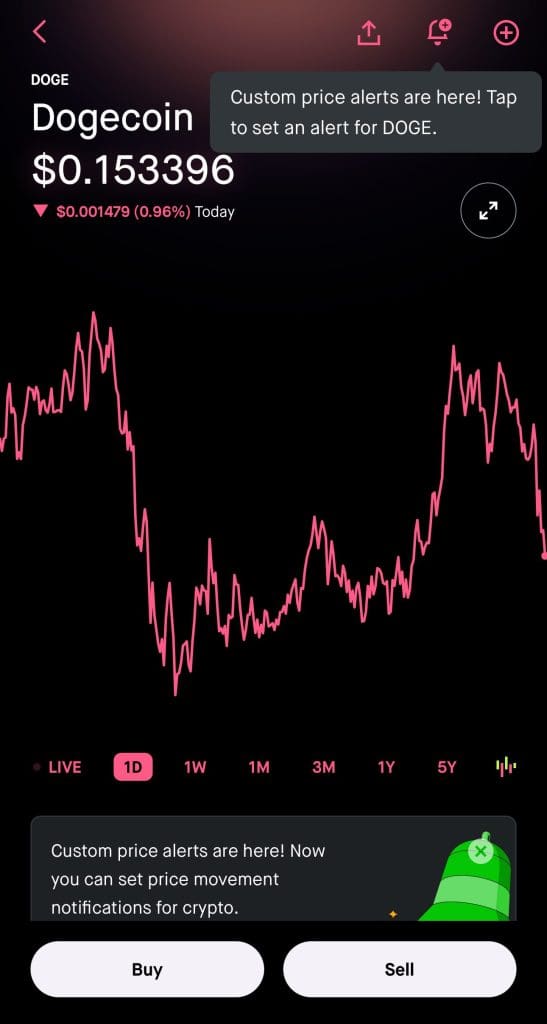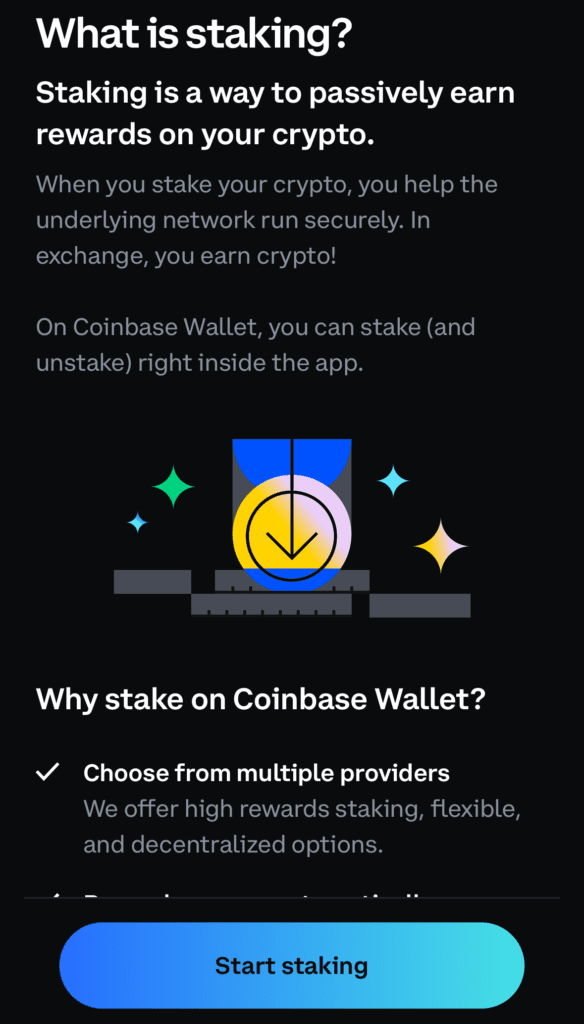Coinbase | Robinhood | |
Supported Coins | +250 | +20 |
Spot Trading Fees | $0.99 – 2.00% (Standard), 0.05% – 0.60% (Advanced Trade)
For transactions above $200 (standard account): 1.49% fee for using a bank account or USD wallet, 3.99% fee for using a debit or credit card. For Coinbase Advanced Trade: 0.60% for taker trades and 0.40% for maker trades. The more you trade, the lower the fees – can decrease to as low as 0% – 0.05%. | $0 |
Future Trading Fees | 0.40% – 0.60%
0.60% for taker trades and 0.40% for maker trades. The more you trade, the lower the fees – can decrease to as low as 0% – 0.04%.
| N/A |
Our Rating |
(4.5/5) |
(4.4/5) |
Read Review | Read Review |
Coinbase vs Robinhood: Compare The Best Features
When choosing between Coinbase and Robinhood for crypto trading, it’s important to look beyond just the brand name.
Both platforms offer strong features, but they cater to slightly different types of users. Let’s dive into a direct comparison based on real features, examples, and user experience.
-
Ease of Use & Mobile App Experience
Coinbase shines with its beginner-friendly interface. It offers a clean dashboard where users can easily buy Bitcoin, Ethereum, or altcoins with just a few clicks.
It also mirrors the full desktop experience inside its mobile app, making trading and staking seamless on the go.

Robinhood, however, takes mobile experience even further. The app feels incredibly lightweight yet powerful, allowing users to buy stocks, crypto, or track their retirement accounts all from one place without clutter.

Overall, Robinhood edges out slightly for mobile-first investors who prioritize speed and multitasking.
-
Cryptocurrency Selection
Coinbase wins decisively for variety and crypto exploration potential.
Coinbase offers a massive catalog of +250 cryptocurrencies, from Bitcoin and Solana to niche DeFi tokens, giving investors the freedom to explore or diversify. It even supports stablecoins like USDC, allowing you to earn rewards.

Robinhood focuses on simplicity with a limited range of +20 popular coins like Bitcoin, Ethereum, and Dogecoin. Therefore, serious crypto investors may find it too restrictive if they want to branch into newer projects.

-
Trading Crypto Features & Experience
Coinbase offers traders two options: its basic interface for casual purchases and Advanced Trade for more experienced traders.
Advanced Trade offers real-time charts powered by TradingView, multiple order types (limit, stop, market), and lower fees.

Robinhood shines differently with tools like 24-Hour Market for after-hours stock/crypto trading and custom technical alerts. However, it lacks deep technical trading options like order books or spread control.

In summary, Coinbase offers superior depth for serious crypto traders seeking professional-level tools.
-
Staking Options and Rewards
Coinbase provides a broader and more established staking platform with higher potential rewards.
It offers staking for various cryptocurrencies, including Ethereum, Solana, and Cosmos. Users can earn up to 15% in variable rewards, depending on the asset and network conditions.
However, it charges a 35% commission on staking rewards, which is higher Robinhood.

Robinhood has introduced staking options in select regions, such as Europe, offering a 100% earnings match for Ethereum staking rewards up to €10,000 . However, its staking offerings are more limited compared to Coinbase.
-
DApps and Web3 Integration
Coinbase has embraced Web3 innovation by offering a dedicated Coinbase Wallet that supports NFTs, DeFi apps, and blockchain gaming assets.
For example, you can connect directly to Uniswap to swap tokens or mint NFTs on Solana without leaving the app.

While Robinhood allows crypto transfers, it does not offer native DApp browsing or Web3 access. As a result, users seeking decentralized finance opportunities will feel limited.
Overall, Coinbase leads for Web3 connectivity and decentralized asset management.
-
Wallet Options
Coinbase Wallet offers more extensive features and blockchain integrations for advanced users.
Coinbase Wallet is a self-custody wallet supporting a wide range of cryptocurrencies and NFTs. It allows users to buy, swap, stake, and interact with decentralized applications (dApps) across multiple blockchains.

Robinhood Wallet also offers self-custody features, enabling users to store, send, and receive cryptocurrencies.
It supports Ethereum, Bitcoin, Solana, and other networks, with access to decentralized exchanges (DEXs) for token swaps .
-
Trading Bots and Automation
Coinbase supports automated trading through integrations with platforms like Bitsgap and TradersPost, allowing users to deploy trading bots and strategies via API connections.
Robinhood offers limited automation options. While third-party platforms like TradersPost provide some automation capabilities, Robinhood lacks native support for trading bots.
-
Security Measures And Past Hacks
Coinbase implements robust security measures, including two-factor authentication (2FA), cold storage for the majority of assets, and insurance coverage for digital assets .
However, it has faced security incidents, such as exposed API keys .
Robinhood experienced a significant data breach in 2021, affecting approximately 7 million users . Since then, it has enhanced its security protocols, including offering identity theft protection services.
Which Investors May Prefer Coinbase Exchange?
Coinbase is one of the top exchanges for crypto beginners, especially those who value security, variety, and simplicity:
New Crypto Investors: The intuitive interface, educational resources, and easy onboarding process are ideal for beginners who want a smooth start.
Crypto Enthusiasts Exploring Altcoins: With over 250 cryptocurrencies and access to DeFi tokens, Coinbase allows broad diversification.
Investors Interested in Web3: Its Coinbase Wallet connects users to NFTs, decentralized apps, and staking opportunities.
Security-Conscious Users: Advanced cold storage, 2FA, and compliance with U.S. regulations provide peace of mind.
If you want broad crypto access with reliable safety measures and smooth Web3 integration, Coinbase stands out.
Which Investors May Prefer Robinhood Crypto?
Robinhood Crypto is a strong match for users who prefer simplicity, speed, and integrated investing options:
Mobile-First Investors: Robinhood’s sleek, fast mobile app makes it easy to trade stocks and crypto from anywhere.
Cost-Conscious Traders: Robinhood keeps costs minimal with commission-free crypto trades and no deposit or withdrawal fees.
Beginner Investors: The streamlined experience removes the complexity of wallets, order books, or DeFi tools.
Multi-Asset Traders: Robinhood is efficient for users who want to manage crypto, stocks, options, and retirement accounts under one roof.
If you want quick trades, low fees, and a simple setup without diving deep into Web3 or DeFi, Robinhood Crypto is a good choice.
Bottom Line: Which Platform Excels Where?
Coinbase excels at offering a full crypto ecosystem — including advanced staking, altcoin diversity, and Web3 access — ideal for investors who want serious crypto exposure.
Robinhood shines with its unbeatable mobile experience, zero-commission trading, and multi-asset management, perfect for users seeking simple, fast crypto access alongside stocks.
Your choice comes down to whether you want crypto simplicity or crypto depth.
